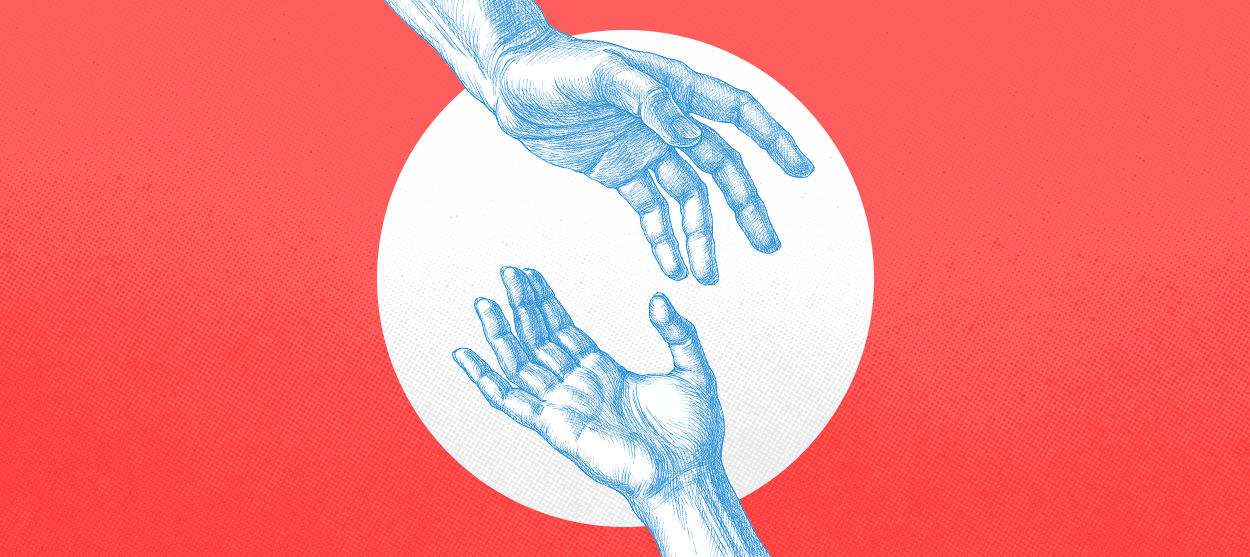The American Dream was built on 'handouts'
Have we forgotten that social mobility relies on community?


A free daily email with the biggest news stories of the day – and the best features from TheWeek.com
You are now subscribed
Your newsletter sign-up was successful
Americans love a good rags-to-riches tale. We have long touted stories of the American Dream that involve grit, doggedness, and the surmounting of unbelievable odds.
We do this in large part because we want to believe anyone and everyone can "make it." We want to believe that our country makes it possible for all people, no matter their class or background, to become rich and successful.
But things are far more difficult and complex than the average Cinderella story would have you believe. We rarely (if ever) succeed on our own. The American Dream touts a form of individualism that flattens our success stories, making complex truths into narrow, self-serving fantasies.
The Week
Escape your echo chamber. Get the facts behind the news, plus analysis from multiple perspectives.

Sign up for The Week's Free Newsletters
From our morning news briefing to a weekly Good News Newsletter, get the best of The Week delivered directly to your inbox.
From our morning news briefing to a weekly Good News Newsletter, get the best of The Week delivered directly to your inbox.
Rep. Alexandria Ocasio-Cortez (D-N.Y.) hinted at this at a recent committee meeting in the House, noting that "it's a physical impossibility to lift yourself up by a bootstrap, by your shoelaces. It's physically impossible. The whole thing is a joke."
Many were quick to point out, in response, that Ocasio-Cortez is a former bartender now-congresswoman, and thus an exemplar of the old American Dream storyline. But Cortez rebutted this by pointing out that, despite all her hard work, "it would be narcissistic to pretend I 'bootstrapped' it alone & w/o others [sic]."
Many Americans are deeply invested in our national vision of the upwardly mobile underdog. And we do have some stories, throughout our history, of people who "made it" without any help. But to suggest that this is the norm — or even that it's the preferred means of success — would be wrong. Because we don't want American success to be bound to the whims of fate and isolated grit. We want them to have a support system to lean on, no matter where they live or who they are. Tales of tenacious individualism are insufficient to describe what the American Dream should be; we also need stories of people who received a hand up to help them beat the odds.
In his book Alienated America, Tim Carney argues that civil associations are largely responsible for health and hope in many American towns, and that their deterioration has caused the American Dream to falter (and, in many places, die out altogether). Success in our country has never been exclusively an issue of income or individualism — it is also deeply reliant on community and culture, on the religious and cultural associations that help a place (and everyone in that place) thrive.
A free daily email with the biggest news stories of the day – and the best features from TheWeek.com
I've been thinking about this a lot, because I have spent a good deal of time lately learning more about the lives of my great-grandparents. My great-grandfather was a farmer, my great-grandmother the daughter of immigrants. They had less than five dollars when they moved into their first farmhouse post-marriage, at the beginning of the Great Depression.
My great-great-grandmother gifted some spices to her new daughter-in-law, so she had something to cook with. My great-great-great grandfather offered his grandson some farmland at a cheap price, and gave him his first team of horses. The neighbors surrounding them offered free lumber, a grain drill, hay, and five head of milk cows. They were still extremely sparse years for the couple. But thanks to all the support they received, they made it — despite the economic hardship surrounding them.
But clearly they did not make it on their own. Once they were older and more established, my great-grandparents were very deliberate about giving to other young people who needed a start, a hand up. And so this version of the "American Dream" — a connected, community-oriented system of giving and supporting, helping people in their time of need — was extended to following generations. Our entire rural culture was built on generosity — on "handouts," big and small.
Professor and sociologist Robert Nisbet once warned in his book Quest for Community that liberalism's emphasis on the "discrete individual — autonomous, self-sufficing, and stable" — emancipated man from his communal responsibilities and relationships. Without strong communal ties, only individualism (and its resultant isolation) remain. And that lonely individualism is dangerous — because grit doesn't fix things or help people, not by itself.
This is what I think Ocasio-Cortez is getting at, although she's also specifically defending government programs in her speech and following Twitter thread. There are many extremely harmful barriers to mobility and prosperity in our country, and pluck cannot — by itself — overcome those barriers. Our vision of the American Dream cannot ignore economic inequality, racism, social isolation, cultural breakdown, and the like. A kid growing up in an economically devastated neighborhood does not have the same chances of success as the kid who lives in a wealthy D.C. exurb whose parents went to Yale. And unless we can build up these communities, and foster greater supports and opportunities for the kids who feel "left behind," we will not be able to resurrect the American Dream.
I hate using that term, because it compresses something that is very complex and diverse. There are a lot of Americans whose version of the "American Dream" will not look like a single-family home with a car and a 9-to-5 job, and it would be wrong to measure their success or happiness in that way. There are a lot of Americans who will never make a six-figure salary, or move from the state where they were born, but who will still live happy and fulfilling lives. That's what happened to my great-grandparents. The "American Dream," narrowly understood, is thus a poor descriptor of success or happiness in the United States.
But we do believe that all Americans should have the chance to build a good, stable life for themselves and their families. If that is our version of the "American Dream" — if the term allows for, or even encourages, hand ups and handouts — then I think the term will be less pretentious and saccharine. It might even become attainable again.
Want more essential commentary and analysis like this delivered straight to your inbox? Sign up for The Week's "Today's best articles" newsletter here.
Gracy Olmstead is a writer and journalist located outside Washington, D.C. She's written for The American Conservative, National Review, The Federalist, and The Washington Times, among others.
-
 Political cartoons for February 16
Political cartoons for February 16Cartoons Monday’s political cartoons include President's Day, a valentine from the Epstein files, and more
-
 Regent Hong Kong: a tranquil haven with a prime waterfront spot
Regent Hong Kong: a tranquil haven with a prime waterfront spotThe Week Recommends The trendy hotel recently underwent an extensive two-year revamp
-
 The problem with diagnosing profound autism
The problem with diagnosing profound autismThe Explainer Experts are reconsidering the idea of autism as a spectrum, which could impact diagnoses and policy making for the condition
-
 The billionaires’ wealth tax: a catastrophe for California?
The billionaires’ wealth tax: a catastrophe for California?Talking Point Peter Thiel and Larry Page preparing to change state residency
-
 Bari Weiss’ ‘60 Minutes’ scandal is about more than one report
Bari Weiss’ ‘60 Minutes’ scandal is about more than one reportIN THE SPOTLIGHT By blocking an approved segment on a controversial prison holding US deportees in El Salvador, the editor-in-chief of CBS News has become the main story
-
 Has Zohran Mamdani shown the Democrats how to win again?
Has Zohran Mamdani shown the Democrats how to win again?Today’s Big Question New York City mayoral election touted as victory for left-wing populists but moderate centrist wins elsewhere present more complex path for Democratic Party
-
 Millions turn out for anti-Trump ‘No Kings’ rallies
Millions turn out for anti-Trump ‘No Kings’ ralliesSpeed Read An estimated 7 million people participated, 2 million more than at the first ‘No Kings’ protest in June
-
 Ghislaine Maxwell: angling for a Trump pardon
Ghislaine Maxwell: angling for a Trump pardonTalking Point Convicted sex trafficker's testimony could shed new light on president's links to Jeffrey Epstein
-
 The last words and final moments of 40 presidents
The last words and final moments of 40 presidentsThe Explainer Some are eloquent quotes worthy of the holders of the highest office in the nation, and others... aren't
-
 The JFK files: the truth at last?
The JFK files: the truth at last?In The Spotlight More than 64,000 previously classified documents relating the 1963 assassination of John F. Kennedy have been released by the Trump administration
-
 'Seriously, not literally': how should the world take Donald Trump?
'Seriously, not literally': how should the world take Donald Trump?Today's big question White House rhetoric and reality look likely to become increasingly blurred
